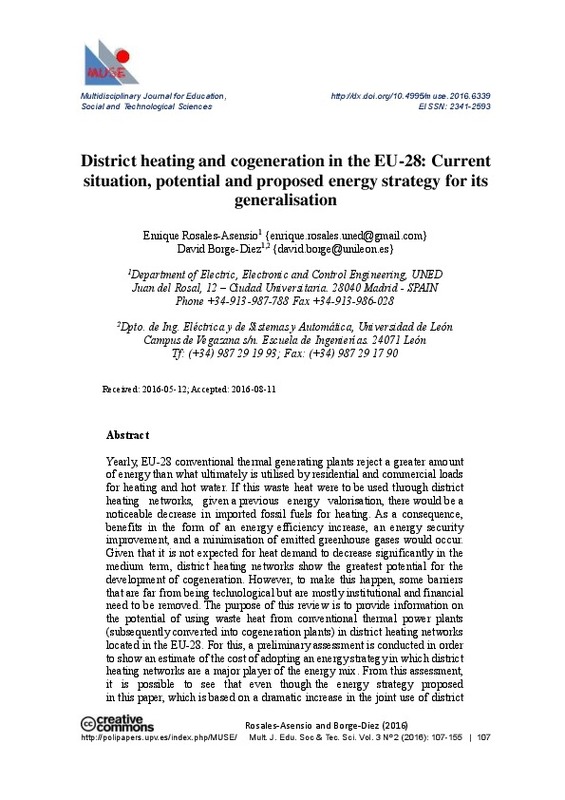JavaScript is disabled for your browser. Some features of this site may not work without it.
Buscar en RiuNet
Listar
Mi cuenta
Estadísticas
Ayuda RiuNet
Admin. UPV
District heating and cogeneration in the EU-28: Current situation, potential and proposed energy strategy for its generalisation
Mostrar el registro sencillo del ítem
Ficheros en el ítem
| dc.contributor.author | Rosales-Asensio, Enrique
|
es_ES |
| dc.contributor.author | Borge-Diez, David
|
es_ES |
| dc.date.accessioned | 2017-01-17T12:06:24Z | |
| dc.date.available | 2017-01-17T12:06:24Z | |
| dc.date.issued | 2016-10-03 | |
| dc.identifier.uri | http://hdl.handle.net/10251/76937 | |
| dc.description.abstract | [EN] Yearly, EU-28 conventional thermal generating plants reject a greater amount of energy than what ultimately is utilised by residential and commercial loads for heating and hot water. If this waste heat were to be used through district heating networks, given a previous energy valorisation, there would be a noticeable decrease in imported fossil fuels for heating. As a consequence, benefits in the form of an energy efficiency increase, an energy security improvement, and a minimisation of emitted greenhouse gases would occur. Given that it is not expected for heat demand to decrease significantly in the medium term, district heating networks show the greatest potential for the development of cogeneration. However, to make this happen, some barriers that are far from being technological but are mostly institutional and financial need to be removed. The purpose of this review is to provide information on the potential of using waste heat from conventional thermal power plants (subsequently converted into cogeneration plants) in district heating networks located in the EU-28. For this, a preliminary assessment is conducted in order to show an estimate of the cost of adopting an energy strategy in which district heating networks are a major player of the energy mix. From this assessment, it is possible to see that even though the energy strategy proposed in this paper, which is based on a dramatic increase in the joint use of district heating networks and cogeneration, is capital-intensive and would require an annual investment of roughly 300 billion euros, its adoption would result in a reduction of yearly fuel expenses in the order of 100 billion euros and a shortening of about 15% of the total final energy consumption, which makes it of paramount interest as an enabler of the legal basis of the “Secure, Clean and Efficient Energy” future enacted by the EU-28 Horizon 2020. | es_ES |
| dc.description.sponsorship | We are grateful to the experts contacted who gave us their support, in particular and especially to Poul Alberg Østergaard (Aalborg Universitet), Capezzali Massimiliano (École Polytechnique Fédérale de Lausanne), Kevin Sartor (Université de Liège), Erwin Cornelis (VITO NV), Chiara Wolter (Ambiente Italia), Alexandra Tudoroiu (COGEN Europe), Olu Ogunbadejo (Department for Environment, Food & Rural Affairs), Aleksandrs Zajacs (Riga Technical University), and Carsten Magass (Forschungszentrum Jülich GmbH). Without their participation, this article would not have been possible. | |
| dc.language | Inglés | es_ES |
| dc.publisher | Universitat Politècnica de València | |
| dc.relation.ispartof | Multidisciplinary Journal for Education, Social and Technological Sciences | |
| dc.rights | Reconocimiento - No comercial - Sin obra derivada (by-nc-nd) | es_ES |
| dc.subject | District heating networks | es_ES |
| dc.subject | Cogeneration | es_ES |
| dc.subject | Energy potential | es_ES |
| dc.subject | EU-28 | es_ES |
| dc.title | District heating and cogeneration in the EU-28: Current situation, potential and proposed energy strategy for its generalisation | es_ES |
| dc.type | Artículo | es_ES |
| dc.date.updated | 2017-01-17T11:01:32Z | |
| dc.identifier.doi | 10.4995/muse.2016.6339 | |
| dc.rights.accessRights | Abierto | es_ES |
| dc.description.bibliographicCitation | Rosales-Asensio, E.; Borge-Diez, D. (2016). District heating and cogeneration in the EU-28: Current situation, potential and proposed energy strategy for its generalisation. Multidisciplinary Journal for Education, Social and Technological Sciences. 3(2):107-155. https://doi.org/10.4995/muse.2016.6339 | es_ES |
| dc.description.accrualMethod | SWORD | es_ES |
| dc.relation.publisherversion | https://doi.org/10.4995/muse.2016.6339 | es_ES |
| dc.description.upvformatpinicio | 107 | es_ES |
| dc.description.upvformatpfin | 155 | es_ES |
| dc.type.version | info:eu-repo/semantics/publishedVersion | es_ES |
| dc.description.volume | 3 | |
| dc.description.issue | 2 | |
| dc.identifier.eissn | 2341-2593 |








